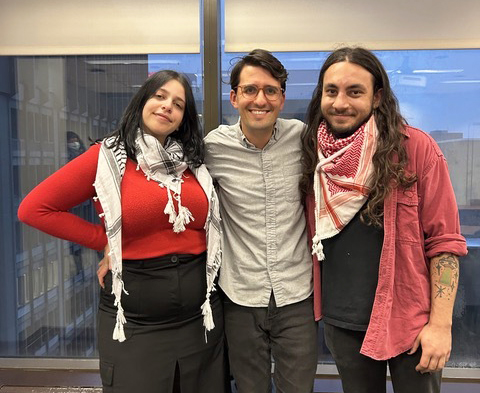On Nov. 9, the Association of Graduate Students Employed at McGill (AGSEM) entered its third bargaining meeting with the McGill administration. Since Sept. 21, AGSEM—the union representing teaching assistants (TAs) at McGill—has been negotiating terms for improved working conditions and wages following the expiration of their collective agreement in July. Amidst negotiations, the union’s No More Free Hours (NMFH) campaign focuses on seeking better compensation for extended work hours not covered by TA’s current salaries.
The recent meeting centred on a discussion around job security and healthcare, according to the union’s press release. Representing AGSEM, bargaining committee members Nada El Baba, Dallas Jokic, and Nick Vieira sat alongside Grievance Officer Jean-Philip Mattieu, Mobilization Officer Kiersten Beszterda van Vliet, Confédération des syndicats nationaux (CSN) advisor Sébastien Boisvert, and CSN intern Andrea Cano.
Six additional union members attended the meeting, including Jesse*, a graduate student and TA in the Department of Anthropology. Jesse asserted that McGill supervisors and administrators discourage graduate students with external or internal fellowships and grants from applying for TA positions. In an email to The Tribune, Jesse described how many of their peers received informal emails from administrators requesting that these students “take one for the team” in favour of incoming students without supplemental funding.
“The implicit message was that students with extra funding were greedy for wanting to take TA positions, even though their external or internal awards amount to an annual revenue that is still under Montreal’s poverty line,” Jesse said.
AGSEM expressed concern that the practice undermines the priority pool rights of those with prior TA experience, a rule ensured in the now-expired collective agreement. Nick Vieira, a third-year physics Ph.D. candidate, wrote to The Tribune in an email, adding that not only does the university hurt the priority pool through discouraging certain students from becoming TAs, it also conflates TA wages with student funding packages.
“In some egregious cases, TA positions are included in students’ funding packages even when the department cannot guarantee that all graduate students will receive TA positions,” Viera wrote. “[Graduate] students are promised that they will receive $X + Y and then told Y is not available to them.”
In the email, Vieira alleged that McGill was willing to ban prohibitory language, where department heads would outright tell students not to apply to TA positions, but would not agree to the union’s proposed language for preventing any discouragement of students looking to become TAs.
During the meeting, union members vocalized demands for better healthcare, namely to align their collective agreement with Article 12 of the Quebec Act Respecting Occupational Health and Safety, which states that workers have the right to refuse work if it exposes a worker “to danger to his health, safety or physical or mental well-being.”
Vieira expressed that workers in the teaching industry can be subject to pressure from supervisors or be put in compromising situations.
“We reject McGill’s suggestion that psychological danger is any less real or pressing than physical danger,” he wrote.
Alex*, another TA in the social sciences department, stated that “wage theft takes the form of difficult situations,” explaining the pedagogical responsibility TAs feel to help students even while receiving no compensation for spillover hours.
The backdrop of the Quebec government’s newly proposed tuition hikes has created a new impetus driving AGSEM’s NMFH campaign. With McGill under financial pressure, Alex fears that the tuition hikes will be used as a pretext for austere budgeting.
“It becomes even more important that our basic wage offers some sense of security when everything around us is being chipped away,” Alex said, voicing anxiety that institutional capacities, extra funding, and resources will be stifled by the tuition hikes.
While negotiations have only discussed non-monetary proposals, Vieira affirmed that the union will bring forth other demands of the NMFH campaign in the future.
“If McGill has to make sacrifices, they should fall to high level administrators who make half a million dollars a year, not students or workers trying to make ends meet,” Vieira stated.
Cynthia Lee, McGill’s Associate Director in Media Relations, in response to a statement request from The Tribune, said “McGill will not make any comments regarding the current discussions and will let the negotiation process run its course.”
*Jesse and Alex’s names have been changed to preserve their confidentiality.
A previous version of this article stated that AGSEM had not touched on non-monetary proposals as of the time of publication. In fact, the union had only discussed non-monetary proposals. The Tribune regrets this error.









